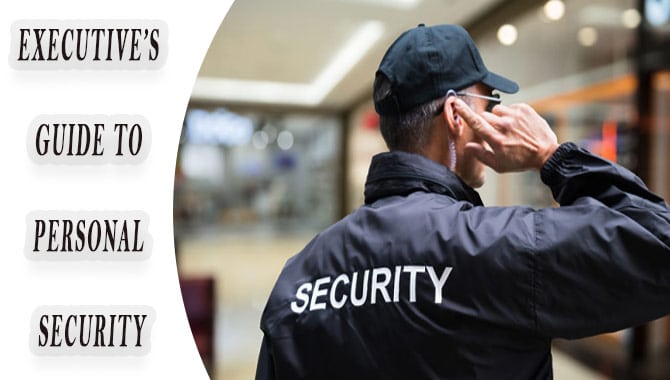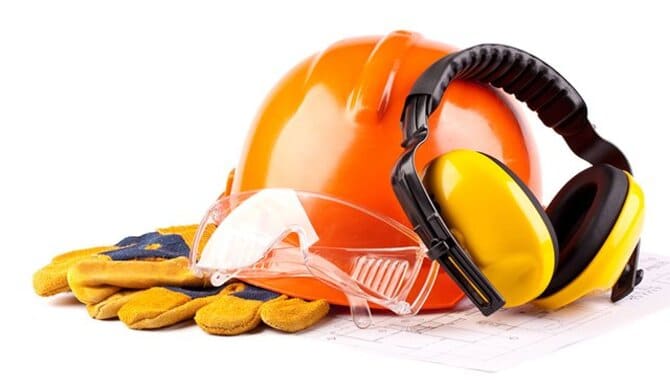Personal security is crucial for anyone who wants to live a safe and peaceful life. You can do several things to protect yourself from harm, both physically and emotionally. Every executive knows the importance of personal security. But with so many threats and dangers out there, it can be hard to know what to do to stay safe. This guide is designed to help you take the first steps towards securing your safety.
By following eight simple tips, you’ll be well on your way to building a strong personal security strategy. In addition, we’ve included useful resources and links that will help you further understand and protect yourself from the dangers that exist today. So whether you’re working at home or in the office, take these steps to stay safe.

Personal Security: 8 Steps To Take Now

Executives take personal security seriously. Even though the world is becoming increasingly digitized, there are still some risks you must consider regarding your security. You can take several important steps to increase your security, no matter where you are in the world. Here are 8 of the most important:
- Ensure you have the right security software installed on your computer and phone. This should include antivirus software, malware protection, and firewall protections.
- Stay aware of the latest security threats and be prepared to take action if there is an emergency. This means being aware of what’s happening worldwide and keeping up to date with news events that may impact your safety.
- Keep up to date with your financial information, especially if you use online banking or credit cards.
- Be suspicious of anyone who asks for personal information – such as your name, address, or bank account numbers – even if they seem friendly and trustworthy at first glance.
- Don’t leave your belongings unattended in public places or parking lots – even if they’re locked inside your car. Avoid carrying large sums of cash around you, and don’t carry unnecessary valuables when traveling abroad.
- Educate yourself about global security concerns and how to protect yourself against them. This includes learning about the threats in your region, such as terrorism or cybercrime.
- Use basic safety precautions when out and about, especially if you’re traveling in a foreign country. Avoid walking alone at night, and using unpatched software on important devices like laptops or smartphones.
- Finally, always use common sense when it comes to personal security – don’t do anything that could put your safety at risk. Stay informed and take simple precautions to stay safe.
The Importance Of Personal Security

Executive security is of the utmost importance, especially in today’s world. There’s no doubt that personal security is one of the most important things you can do for yourself. It’s not only necessary for your safety, but it can also help protect your property and finances.
The best way to protect yourself is to have a comprehensive security plan that includes physical and digital security measures. Physical security measures include:
- Locking your doors.
- Installing deadbolts and alarm systems.
- Keeping a watchful eye on your surroundings.
Digital security involves using safe online habits, encrypting your data, and maintaining a safe online presence.
It’s also important to keep up-to-date with the latest technology trends so that you’re prepared if anything happens to your devices or information. For example, you should always install antivirus software and ensure you’re using secure passwords and sign-in procedures.
You should also be aware of new ways criminals steal information, such as email scams that promise huge payouts in exchange for sensitive information. If you fall for these scams, not only will your personal information be stolen, but the money you invested in the scam will likely go nowhere.
Useful Resources For Personal Safety

Personal safety is of the utmost importance to executives. That’s why it’s important to have access to various resources that can help keep you safe. Here are some useful resources for personal safety:
- Stay informed – keep up to date with the latest news and information about personal safety, so you know what to watch out for.
- Use common sense – always use your best judgment when protecting yourself. If something seems too good to be true, it usually is.
- Familiarize yourself with the warning signs of domestic violence – this will help you identify if someone is in danger and take appropriate action.
- Know your rights – ensure you understand your rights and the laws protecting you. This can help you take action if things go wrong.
- Stay aware of your surroundings – always be aware of who’s around you and their actions. If there’s ever a situation where you feel unsafe, don’t hesitate to call 911 or leave the area immediately.
Conclusion
In the internet and social media age, there is no escaping the dangers of being online. Cyberbullying, online fraud and scams, and sextortion are all very real threats to your safety. There is no doubt that personal security is an important factor for executives. You can significantly increase your safety and security by taking the eight steps listed in this guide.
Read and follow the recommendations to help you stay safe and protected. In addition, be sure to seek out useful resources to help you stay safe and protected daily. We hope that this guide has helped you to take action toward increasing your security.
Frequently Asked Questions
1.How Do I Create A Personal Security Plan?
Ans: To create a personal security plan, start by making a list of the places you always visit and stay at. These are typically high-risk areas, so knowing who is around you and what they’re doing is important. Include places where you work or go to school – these are also generally considered high-risk zones. Once you have a general idea of where you’re at risk, it’s time to create an evacuation plan. This will detail exactly who is responsible for what during each stage of your journey.
2.What Are The Best Ways To Stay Safe When Working From Home?
Ans: When working from home, it’s important to have a virtual security system like SimpliSafe in place. This way, you can rest assured that your personal information is secure, and you won’t have to worry about anything coming into your home uninvited. Also, make sure to have an emergency plan in place and keep all your important documents (including tax returns and banking information) stored safely. And lastly, be vigilant and be on the lookout for any suspicious activity or people you don’t know visiting your home.
3.What Are Some Of The Most Common Dangers That Executives Face Daily?
Ans: Some of the most common dangers that executives face daily include scams, cybercrime, and identity theft. These attacks can take many forms, from individuals’ personal phishing information (like social security numbers or bank account numbers) to hackers stealing confidential corporate data. In addition to physical dangers, executives also face mental health risks from high-stress levels and long hours. Ensure you have a security protocol for your data, such as regular backups, two-factor authentication, and strong passwords.
4.How Can I Protect My Computer And Electronic Files From Theft Or Burglary?
Ans: Installing security software is one of the simplest and most effective ways to protect your computer and electronic files from theft or burglary. Security software helps to protect your computer against viruses, malware, spyware, and other threats. It can also help you monitor your computer’s access, block unauthorized users from accessing your files, and even create reports on security incidents.
There are many different types of security software available on the market, so it’s best to choose one that fits your need. For example, suppose you work in the corporate world and must protect your computer against hacking attempts. In that case, you might want to invest in a more comprehensive security solution like antivirus software.
5.What Steps Should I Take If I’m The Victim Of A Crime At Work?
Ans: If you’re the victim of a crime at work, the most important thing to do is remain calm and collected. Any emotions you may feel (anxiety, anger, fear, etc.) will only worsen the situation. Start by gathering all the evidence that you can. This could include copies of any emails or screenshots of conversations.
Keep all this material safe if you need to use it as evidence in a criminal case. Another step you should take is contacting your company’s HR department or security team. They will be able to guide you through the process of filing a report and protecting your safety.

Leave a Reply